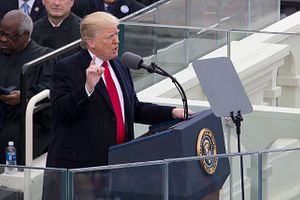The upcoming meeting between U.S. President Donald Trump and Chinese President Xi Jinping has taken on increasing significance after the Trump administration’s health care failure in Congress. That domestic political defeat will have spillover national security consequences if the president is not able quickly to show strength in the international realm.
The current situation suggests the reverse dynamic of President Ronald Reagan’s enhanced credibility after he shockingly carried out his threat to fire the nation’s striking air traffic controllers in 1981.
Foreign governments, both allies and adversaries, took due note of the decisive new president. Overnight, he gained the image of a serious, competent, and tough leader who made bold pronouncements and followed through on them.
A firm, clear Trump message to Xi — with appropriate follow-on action — is sorely needed now. A presidential move or announcement even before the Mar-a-Lago meeting could set the right tone and dissipate the aura of administration ineffectiveness that currently prevails, allowing the president to walk into the room and negotiate from a position of strength.
There is a range of issues from which he can choose.
He could start with the “one China” issue, on which he has been accused of gratuitously stirring the waters, then embarrassingly backing down.
He should affirm Washington’s position that, while the United States recognizes the People’s Republic of China as that nation’s single government, the status of Taiwan as an integral part of a larger polity, or as a permanently separate and independent legal entity, is yet to be determined. That can be done only through mutual agreement and with the consent of the Taiwanese people. Such a statement should be made directly to Xi at the meeting, as well as publicly in their joint press conference afterward.
The president needs to remind Xi that under the Taiwan Relations Act of 1979, the U.S. “consider[s] any effort to determine the future of Taiwan by other than peaceful means, including by boycotts or embargoes, a threat to the peace and security of the Western Pacific area and of grave concern to the United States” (emphasis added). The TRA also obligates the U.S. to provide Taiwan with the weapons it needs to defend itself.
Implicit in those Congressional commitments to Taiwan’s security is the likelihood that the United States will come directly to Taiwan’s defense in the event of an attack from China. Trump should make that commitment clear, certain, explicit, and public. He can also tell Xi that he is prepared to go further in playing the “one China” card in undefined ways if he is not satisfied with China’s position on other issues of U.S. concern.
Once that bedrock, nonnegotiable U.S. policy on Taiwan is established, during or preferably before the meeting, the president can then turn to the other problems Chinese behavior is creating in the region and for the United States. North Korea leads the list.
There are encouraging indications that the Trump administration is unwilling to allow Beijing to continue the cynical double game it has played for the past two decades. No more hypocritical Chinese lip service to a denuclearized Korean Peninsula when it was the United States that removed its tactical nuclear weapons from South Korea in the early 1990s at the same time Chinese nuclear technology was being funneled to North Korea through Pakistan’s A.Q. Khan network. And no more absurd statements from China’s leaders that the United States has to appease Pyongyang with further aid and concessions even as Beijing weakens or circumvents every United Nations sanction designed to pressure North Korean compliance with international law and agreements.
While president-elect, Trump wisely signaled a willingness to punish Chinese entities, both governmental and private, for their complicity in North Korea’s nuclear and missile programs. Any failure to do so effectively would evoke not the Reagan precedent but President Barack Obama’s evanescent red line in Syria.
The urgency of the growing North Korean threat requires an opposite, no-nonsense message from a reinvigorated U.S. president to an as yet-unchallenged Chinese dictator. Only immediate actions with discernible results can suffice to alleviate American suspicions of PRC intentions. If Beijing won’t take them, Washington should do so.
Sure to be included in the litany of China’s dangerous disruptions of the international order are its aggressive actions in the East and South China Sea. The president should make clear that, unlike the timid Freedom of Navigation Operations (FONOPs) conducted by the Obama administration, the U.S. Navy will sail unapologetically in international waters and will brook no interference with those entirely legal activities. Undertaking such a FONOP near China’s illegal artificial islands before the Xi meeting is another way to set the right tone of administration policy clarity and firmness of purpose.
Dramatic administration action to establish the president’s leadership qualities need not be confined to the Asia realm. Announcement of U.S.-protected safe zones in Syria, often suggested by the president-elect, would send a salutary message to both Russian President Vladimir Putin and Xi that they are now dealing with a U.S. president who can neither be fooled nor cowed.
America cannot afford another weakened president and Putin, Xi, North Korea’s Kim Jong-un, and Iran’s Hassan Rouhani — who all see the U.S. as the obstacle to their regional and global ambitions — should be dissuaded from believing that is what they are confronting. Instead, they must be made to understand that the United States as the indispensable nation and America’s president as the indispensable world leader are back and on the job.
Joseph Bosco is a former China country director ion the office of the secretary of defense, 2005-2006.

































